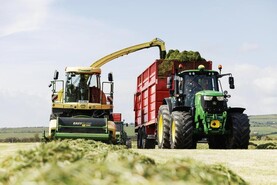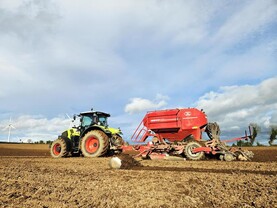There is lots of talk over the last year about labour shortages on dairy farms.
However, it is not the only sector to find it difficult to secure access to labour, with sheep farmers also facing challenges.
The pinch point on sheep farms is generally at lambing, but there are other animal handling-related tasks where labour is in demand.
Panel discussion
Thursday’s Irish Grassland Association (IGA) conference held in the Headfort Arms, Kells, Co Meath, included a panel discussion on the topic.
It included sheep farmer John Bell who runs a flock of 600 ewes in Co Westmeath, Daryl Meehan who operates a part-time sheep flock in Co Westmeath alongside a full-time carpentry job and John O’Connor, farm manager in Kildalton College and part-time sheep and suckler farmer.
Before entering employment in carpentry, Daryl Meehan operated a sheep contracting business on a part-time basis and carried out tasks such as lambing assistance, shearing and animal handling-related tasks such as dosing, weighing lambs, etc.
Daryl is representative of many young people working in agriculture and possessing other qualifications with an improvement in the economy opening up other employment opportunities.
Barrier
He says that a barrier to continuing to operate and possibly expand the sheep contracting business was the seasonal nature of work and lack of guaranteed employment.
The possibility of returning to a similar role at some stage in the future is something he remains open to, while he also sees a potential in working in his current job and sharing labour with other farmers.
Small things like having penning set up to cut down on set-up time
Daryl also feels there is more farmers can do with their own enterprises to improve labour efficiency and ease the burden in carrying out many animal handling tasks.
This was a view echoed by John Bell who Daryl previously worked for.
John said that it is difficult to get labour and that a big factor in securing repeat help is how the farm is set up and the nature in which tasks are carried out.
“Small things like having penning set up to cut down on set-up time and also operating a day’s work in one day and not trying to fit in two day’s work into one will help greatly.
"You can’t expect someone to come and help you if they are waiting around for a long time to get going, then expected to do more work than reasonable and not finish at the agreed time.”
Payment
Payment was also highlighted as an important factor.
“If we want people to work on farms, then we have to be realistic and pay them what they are due.
"If we go to a mechanic or a vet, we pay the going rate and we have to do the same if we are to compete and attract labour on to farms.
"Yes, labour is not cheap, but work-life balance and the efficiency at which tasks are done when help is at hand makes it more than worthwhile.”
Some tasks you can do yourself, but others work a lot better if there is help at hand
Like Daryl, John is also open to the idea of shared labour, citing improved efficiency.
“Some tasks you can do yourself, but others work a lot better if there is help at hand.
"It could take me a day to do some jobs with help, while if I was on my own it might take three.
"I can tell you I would also be more reluctant to take into some of them on my own, so there is a risk they might be delayed.”
Student experience
As well as being farm manager in Kildalton, John O’Connor also places students on farm as part of their practical work experience.
He told the 200-strong attendance there is a fine line between giving a student good work experience and being treated as an extra labour unit.
John said students that have a good experience are much more likely to return to work on farms.
“There has to be a learning element with students.
"The majority of farms are good, but we have had stories where a student has gone out to a farm to lamb and spent the time cleaning and bedding pens or feeding pet lambs.
"Yes, these are tasks that are part and parcel, but there also has to be time invested in showing students how to lamb ewes along with the many other important tasks.”
Hired help
He highlighted that his own mixed sheep and suckler farm would not operate as easily without hired help at lambing.
“Making the job easier and having a good setup will attract people back.
"I have had people who helped me at lambing return for many other jobs and the same goes for many of the farms students do placement on.”
It is regularly said that there is no young people interested in sheep farming, but John says this is not accurate.
“While there may be fewer people interested in drystock than dairy, there is still a good number that have a deep interest in the sector.
"We had 15 great students doing the sheep module and any of them will enhance the sheep sector.”
In highlighting the four essential aspects all sheep farms should have, John said good sheep fencing is vital, along with a simple but effective handling unit.
For handling sheep, a good sheep dog is highlighted as being integral to a one-man system, while a quad is the last piece of the jigsaw needed in John's opinion to cut down the workload on sheep farms.
Read more
Cost of difficult spring and drought in 2018 highlighted at IGA farm walk
Mandatory EID drives surge in demand for sheep tags
There is lots of talk over the last year about labour shortages on dairy farms.
However, it is not the only sector to find it difficult to secure access to labour, with sheep farmers also facing challenges.
The pinch point on sheep farms is generally at lambing, but there are other animal handling-related tasks where labour is in demand.
Panel discussion
Thursday’s Irish Grassland Association (IGA) conference held in the Headfort Arms, Kells, Co Meath, included a panel discussion on the topic.
It included sheep farmer John Bell who runs a flock of 600 ewes in Co Westmeath, Daryl Meehan who operates a part-time sheep flock in Co Westmeath alongside a full-time carpentry job and John O’Connor, farm manager in Kildalton College and part-time sheep and suckler farmer.
Before entering employment in carpentry, Daryl Meehan operated a sheep contracting business on a part-time basis and carried out tasks such as lambing assistance, shearing and animal handling-related tasks such as dosing, weighing lambs, etc.
Daryl is representative of many young people working in agriculture and possessing other qualifications with an improvement in the economy opening up other employment opportunities.
Barrier
He says that a barrier to continuing to operate and possibly expand the sheep contracting business was the seasonal nature of work and lack of guaranteed employment.
The possibility of returning to a similar role at some stage in the future is something he remains open to, while he also sees a potential in working in his current job and sharing labour with other farmers.
Small things like having penning set up to cut down on set-up time
Daryl also feels there is more farmers can do with their own enterprises to improve labour efficiency and ease the burden in carrying out many animal handling tasks.
This was a view echoed by John Bell who Daryl previously worked for.
John said that it is difficult to get labour and that a big factor in securing repeat help is how the farm is set up and the nature in which tasks are carried out.
“Small things like having penning set up to cut down on set-up time and also operating a day’s work in one day and not trying to fit in two day’s work into one will help greatly.
"You can’t expect someone to come and help you if they are waiting around for a long time to get going, then expected to do more work than reasonable and not finish at the agreed time.”
Payment
Payment was also highlighted as an important factor.
“If we want people to work on farms, then we have to be realistic and pay them what they are due.
"If we go to a mechanic or a vet, we pay the going rate and we have to do the same if we are to compete and attract labour on to farms.
"Yes, labour is not cheap, but work-life balance and the efficiency at which tasks are done when help is at hand makes it more than worthwhile.”
Some tasks you can do yourself, but others work a lot better if there is help at hand
Like Daryl, John is also open to the idea of shared labour, citing improved efficiency.
“Some tasks you can do yourself, but others work a lot better if there is help at hand.
"It could take me a day to do some jobs with help, while if I was on my own it might take three.
"I can tell you I would also be more reluctant to take into some of them on my own, so there is a risk they might be delayed.”
Student experience
As well as being farm manager in Kildalton, John O’Connor also places students on farm as part of their practical work experience.
He told the 200-strong attendance there is a fine line between giving a student good work experience and being treated as an extra labour unit.
John said students that have a good experience are much more likely to return to work on farms.
“There has to be a learning element with students.
"The majority of farms are good, but we have had stories where a student has gone out to a farm to lamb and spent the time cleaning and bedding pens or feeding pet lambs.
"Yes, these are tasks that are part and parcel, but there also has to be time invested in showing students how to lamb ewes along with the many other important tasks.”
Hired help
He highlighted that his own mixed sheep and suckler farm would not operate as easily without hired help at lambing.
“Making the job easier and having a good setup will attract people back.
"I have had people who helped me at lambing return for many other jobs and the same goes for many of the farms students do placement on.”
It is regularly said that there is no young people interested in sheep farming, but John says this is not accurate.
“While there may be fewer people interested in drystock than dairy, there is still a good number that have a deep interest in the sector.
"We had 15 great students doing the sheep module and any of them will enhance the sheep sector.”
In highlighting the four essential aspects all sheep farms should have, John said good sheep fencing is vital, along with a simple but effective handling unit.
For handling sheep, a good sheep dog is highlighted as being integral to a one-man system, while a quad is the last piece of the jigsaw needed in John's opinion to cut down the workload on sheep farms.
Read more
Cost of difficult spring and drought in 2018 highlighted at IGA farm walk
Mandatory EID drives surge in demand for sheep tags






 This is a subscriber-only article
This is a subscriber-only article












SHARING OPTIONS: